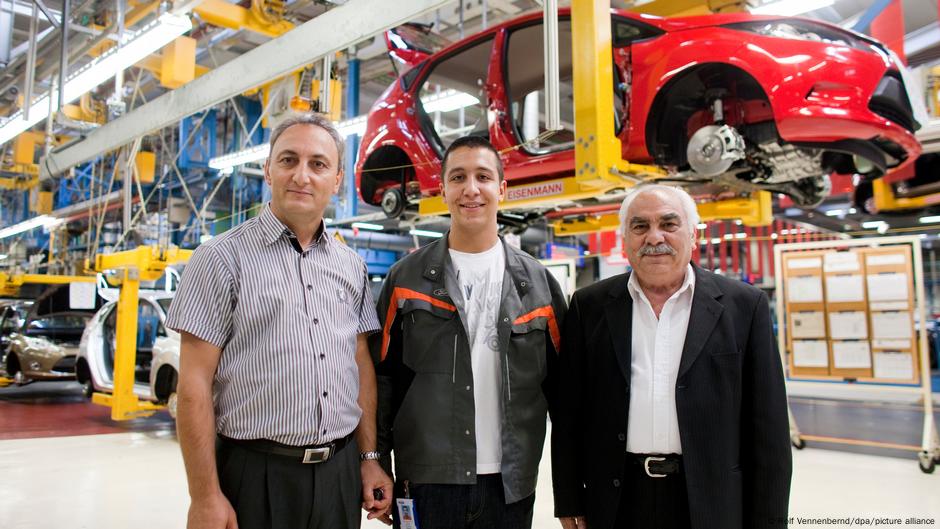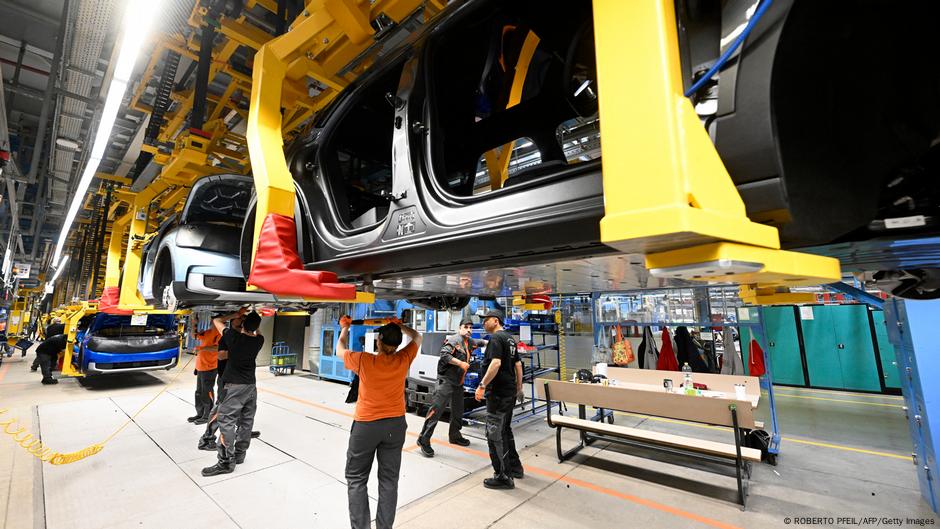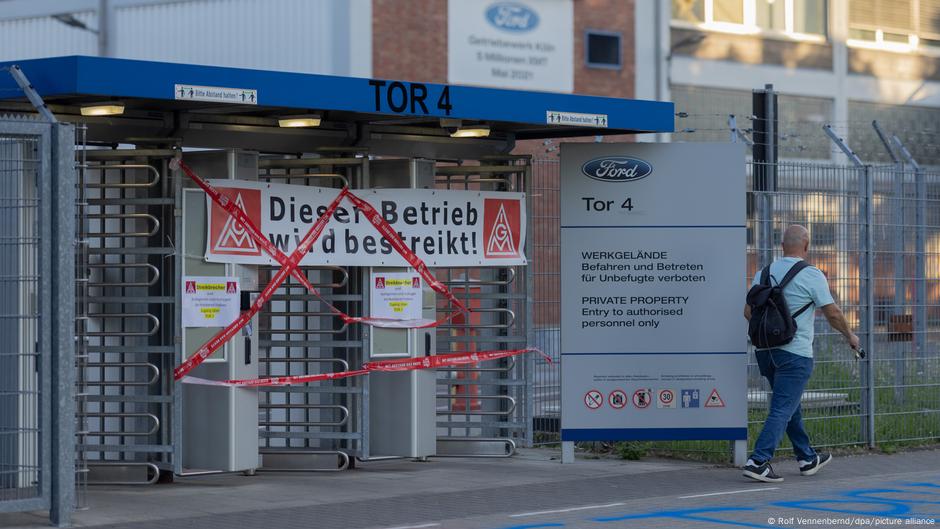Ford is facing a crisis as more than 10,000 employees in Cologne have gone on strike this month—the first such action in the facility’s century-long existence. These recent developments put numerous jobs in jeopardy.
On Wednesday morning, May 14, Gate Four at the Ford plant in Cologne is cordoned off using red-and-white barrier tape. At the entrance gates, several notices state “ Strikebreakers enter via Gate 1.” However, very few people comply with this directive. As reported by David Lüdtke, who serves as an employee representative for the IG-Metall union at Ford, over 10,000 out of 11,500 workers participated in the strike lasting for these 24 hours.
A 30-year-old development engineer named Ahmet Cözmez works in Ford’s production development division. He stated, “We are concerned, feeling stressed and uneasy.”
In 1970, his grandfather arrived in Germany as what was known as a “guest worker,” journeying by train from Istanbul to Cologne, where he labored on the Ford assembly line. Cozmez’s father was employed as a production worker for the American automaker. He concurrently served as a full-time member of the works council and represented employees on the Ford supervisory board.
“The essence of Ford runs through our veins,” states Cüzmeş. “Once a Ford employee, forever a Ford employee” was the guiding principle for earlier generations in his clan: Join Ford, and your position is secure for life. However, things have changed now as the American corporation has evolved.
plans to reduce 2,900 positions
At this plant in Cologne.

Solidarity with Ford workers
The single-day strike marked the inaugural officially sanctioned walkout at the Cologne facility. In 1973, workers of Turkish origin participated in an unsanctioned work stoppage, though this action lacked organization by a recognized labor union.
The Ford employees weren’t alone in their walkout that day. Workers affiliated with the IG Metall metalworkers’ union traveled from various parts of Germany to back them up, along with those from the mining and chemical sectors. Additionally, the protesters garnered messages of support from international counterparts.
Ahmet Cözmez mentioned that although numerous individuals were prepared to combat for their employment, there was significant ambiguity.
Ford exhibits indications of vulnerability.
Industry insiders are concerned about Ford’s prospects in Europe, suggesting that things look grim ahead. As stated by Ferdinand Dudenhöffer, the director of the Bochum-based Center for Automotive Research (CAR), “While the current scenario is dire, the forecast looks even bleaker.” According to him, Ford lacks sufficient scale as a minor participant in the European passenger car market to achieve profitability.
Ford’s operations in Europe have been experiencing losses for quite a while. The compact Ford Fiesta sedan, produced in Cologne, had long been a significant sales winner; however, production ceased in 2023 to pave the way for new electric vehicles.
Ford now manufactures two
electric cars
In Cologne, however, the sales figures for these vehicles have fallen short of expectations, and the firm’s approximately €2 billion ($2.3 billion) expenditure on manufacturing the new electric cars hasn’t yet yielded returns.

German automobile makers lagged behind in adopting electrification,” according to Anita Wölfl, an expert at the ifo Center for the Economics of Innovation and Digital Transformation. “Ford appears to be having an even harder time with this transition.
The state of the economy influences the automobile sector.
Ford clearly
isn’t the only one
facing pressure. Various automobile makers, including
Volkswagen
Mercedes-Benz and BMW are also beginning to show weaknesses.
The car industry has been notably impacted by the recent economic decline. When finances are strained, individuals must still purchase food — yet they might postpone acquiring a new vehicle.
car
Germany is presently experiencing a recession for the second consecutive year. Wölfl mentioned that this situation affects the whole country.
auto industry
had observed some hesitation among consumers.
Fear of international consequences
The impact of the Ford crisis in Cologne might extend beyond Germany’s borders, leading to repercussions across various industries internationally due to a weakened automotive sector in the country.
Furthermore, we have the impact of the Trump factor.
US tariffs on cars
And automotive components are harming the auto sector,” stated Wölfl. “This industry is marked by a intricate, globally interconnected supply network: ‘Should a business escape direct impact, the duties might still lead to secondary effects.’
Fighting for security
Even though the prospects for Ford look grim, David Lüdtke from IG Metall states that the union continues to advocate for the company’s future and aims to protect employment.
If they are not successful, IG Metall aims to guarantee that all workers get equitable remuneration, as well.
transfer measures
, along with robust security measures including insurance for insolvency. Recently, this has become an even greater priority.
Early this year, Ford USA declared an investment of several billion euros into its operations in Germany. However, as part of this decision, they revoked the “comfort letter” from 2006, where the U.S.-based parent firm had committed to covering the financial responsibilities of its German branch.
IG Metall and the Works Council are concerned that the withdrawal of the comfort letter indicates the possibility that even though they were previously assured there would be no layoffs until 2032, this promise might now be at risk.
Workers’ union fights on
Despite all the uncertainties, the strike appears to have made an impact. “Even though we don’t yet have conclusive results, the negotiations have advanced since then and are now more favorable to us,” according to Lüdtke.
The specifics have not been finalized, however, IG Metall Cologne stated that they have come to an understanding with German leadership regarding the main issues to be discussed in future negotiations.
“After coordinating with the corporate headquarters in the US, a choice will be made regarding our next steps: whether we should keep negotiating or pursue additional industrial actions,” stated Lüdtke.
The translation of this article was originally done from German.
Author: Nadine Mena Michollek







